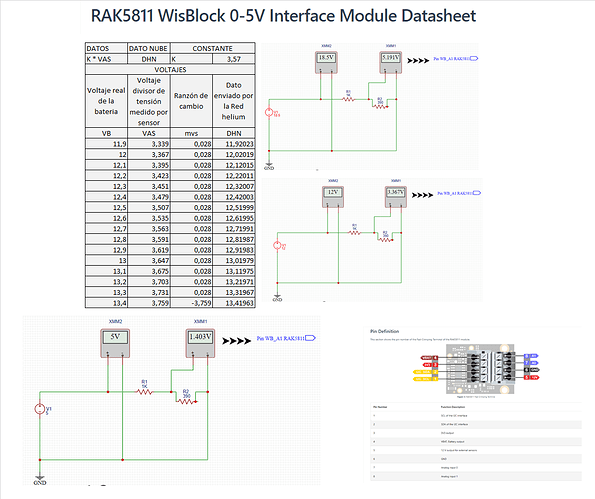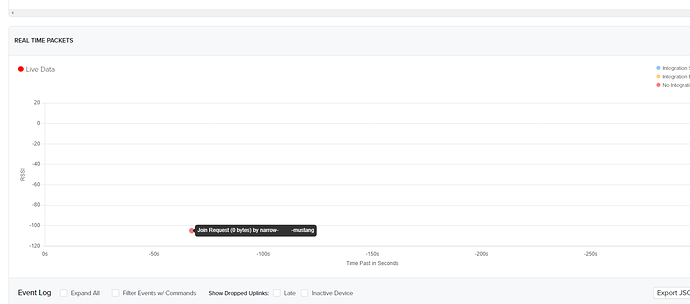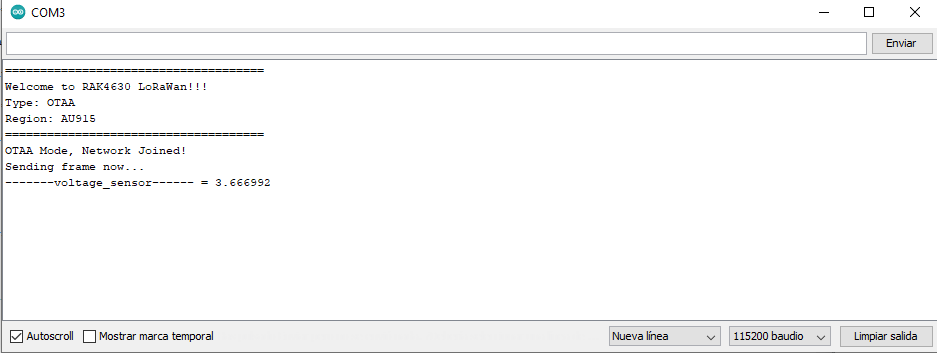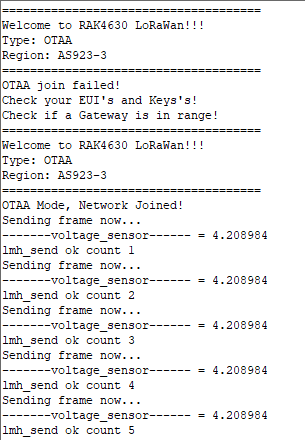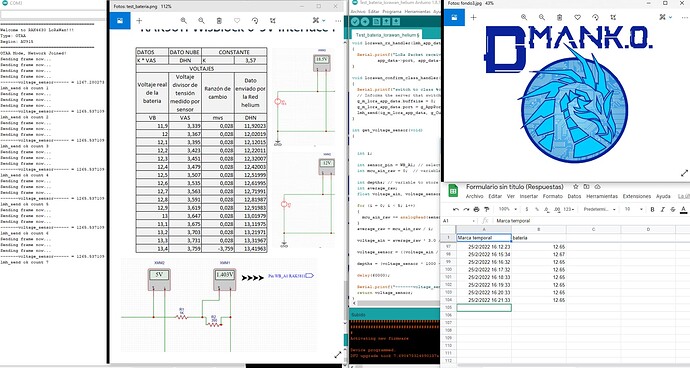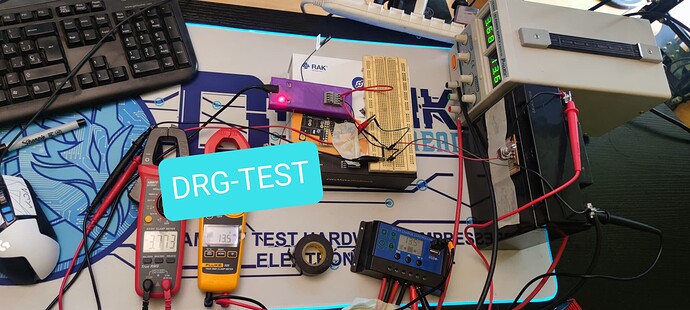Hello, I do not speak English very well and I am trying to spread this to the Spanish language, I intend to implement these sensors in rural areas of my country, for example the coastal areas of Tarapacá, I am not a company or anything similar, I am simply a person who like to share.
A few days ago I acquired the helium developer kit, I have a hotspot in my house and another section, which I intend to install with solar panels, with the idea of knowing the battery voltage of the hotspot I decided to start this project to create a network for my city , I have managed to use the examples, but I still cannot put together the RAK5811 example to send data over the helium network, I wanted to know if you could help me finish this project, which I want to share with Spanish-speaking people, I know how to program Arduino but at a local, without communications and I wanted to know if you can help me put together this code that I am advancing. I leave you the information, and the idea.
I first made this voltage divider to lower the voltage a bit and add it to this module.
then try to use this code to guide me to transmit data over helium network.
Código Lorawan helium network
with this sample code in arduinoIDE /RAK Wisblock Examples/RAK4631/IO/RAK5811_0-5V
/**
* @file RAK5811_0-5V.ino
* @author rakwireless.com
* @brief 0 to 5V analog input example.
* @version 0.1
* @date 2020-07-28
* @copyright Copyright (c) 2020
*/
#include <Arduino.h>
#include <Adafruit_TinyUSB.h>
#define NO_OF_SAMPLES 32
void setup()
{
time_t timeout = millis();
Serial.begin(115200);
while (!Serial)
{
if ((millis() - timeout) < 5000)
{
delay(100);
}
else
{
break;
}
}
/* WisBLOCK 5811 Power On*/
pinMode(WB_IO1, OUTPUT);
digitalWrite(WB_IO1, HIGH);
/* WisBLOCK 5811 Power On*/
pinMode(WB_A1, INPUT_PULLDOWN);
analogReference(AR_INTERNAL_3_0);
analogOversampling(128);
}
void loop()
{
int i;
int mcu_ain_raw = 0;
int depths; // variable to store the value of oil depths
int average_raw;
float mcu_ain_voltage;
float voltage_sensor; // variable to store the value coming from the sensor
for (i = 0; i < NO_OF_SAMPLES; i++)
{
mcu_ain_raw += analogRead(WB_A1); // the input pin A1 for the potentiometer
}
average_raw = mcu_ain_raw / i; // la media de 32 mediciones
mcu_ain_voltage = average_raw * 3.0 / 1024; //raef 3.0V / 10bit ADC
voltage_sensor = mcu_ain_voltage / 0.6; //WisBlock RAK5811 (0 ~ 5V). Input signal reduced to 6/10 and output
depths = (voltage_sensor * 1000 - 574) * 2.5; //Convert to millivolt. 574mv is the default output from sensor
Serial.printf("-------average_value------ = %d\n", average_raw);
Serial.printf("-------voltage_sensor------ = %f\n", voltage_sensor);
Serial.printf("-------depths------ = %d mm\n", depths);
delay(2000);
}
I present my code with errors.
/**
@file Environment_Monitoring.ino
@author rakwireless.com
@brief This sketch demonstrate how to get environment data from BME680
and send the data to lora gateway.
@version 0.1
@date 2020-07-28
@copyright Copyright (c) 2020
**/
#include <Arduino.h>
#include <LoRaWan-RAK4630.h> // Click to install library: http://librarymanager/ALL#SX126x-Arduino
#include <SPI.h>
#include <Adafruit_TinyUSB.h>
#include <Wire.h>
#include <U8g2lib.h> // Click to install library: http://librarymanager/ALL#u8g2
U8G2_SSD1306_128X64_NONAME_F_HW_I2C u8g2(U8G2_R0);
#define NO_OF_SAMPLES 32
// RAK4630 supply two LED
#ifndef LED_BUILTIN
#define LED_BUILTIN 35
#endif
#ifndef LED_BUILTIN2
#define LED_BUILTIN2 36
#endif
bool doOTAA = true; // OTAA is used by default.
#define SCHED_MAX_EVENT_DATA_SIZE APP_TIMER_SCHED_EVENT_DATA_SIZE /**< Maximum size of scheduler events. */
#define SCHED_QUEUE_SIZE 60 /**< Maximum number of events in the scheduler queue. */
#define LORAWAN_DATERATE DR_3 /*LoRaMac datarates definition, from DR_0 to DR_5*/
#define LORAWAN_TX_POWER TX_POWER_0 /*LoRaMac tx power definition, from TX_POWER_0 to TX_POWER_15*/
#define JOINREQ_NBTRIALS 5 /**< Number of trials for the join request. */
DeviceClass_t g_CurrentClass = CLASS_A; /* class definition*/
LoRaMacRegion_t g_CurrentRegion = LORAMAC_REGION_AU915; /* Region:EU868*/
lmh_confirm g_CurrentConfirm = LMH_CONFIRMED_MSG; /* confirm/unconfirm packet definition*/
uint8_t gAppPort = LORAWAN_APP_PORT; /* data port*/
/**@brief Structure containing LoRaWan parameters, needed for lmh_init()
*/
static lmh_param_t g_lora_param_init = {LORAWAN_ADR_OFF, LORAWAN_DATERATE, LORAWAN_PUBLIC_NETWORK, JOINREQ_NBTRIALS, LORAWAN_TX_POWER, LORAWAN_DUTYCYCLE_OFF};
// Foward declaration
static void lorawan_has_joined_handler(void);
void lorawan_join_fail(void);
static void lorawan_rx_handler(lmh_app_data_t *app_data);
static void lorawan_confirm_class_handler(DeviceClass_t Class);
static void send_lora_frame(void);
/**@brief Structure containing LoRaWan callback functions, needed for lmh_init()
*/
static lmh_callback_t g_lora_callbacks = {BoardGetBatteryLevel, BoardGetUniqueId, BoardGetRandomSeed,
lorawan_rx_handler, lorawan_has_joined_handler, lorawan_confirm_class_handler, lorawan_join_fail
};
//OTAA keys !!!! KEYS ARE MSB !!!!
uint8_t nodeDeviceEUI[8] = {0x60, 0x81, 0xF9, 0x97, 0x1E, 0x55, 0xD7, 0xED};
uint8_t nodeAppEUI[8] = {0x60, 0x81, 0xF9, 0x9F, 0xA6, 0x64, 0x09, 0x01};
uint8_t nodeAppKey[16] = {0xE2, 0x71, 0xF3, 0xE6, 0x8F, 0x8E, 0x42, 0xCC, 0x36, 0x2D, 0xFB, 0x40, 0xC6, 0x43, 0xCE, 0xE6};
// ABP keys
uint32_t nodeDevAddr = 0x260116F8;
uint8_t nodeNwsKey[16] = {0x7E, 0xAC, 0xE2, 0x55, 0xB8, 0xA5, 0xE2, 0x69, 0x91, 0x51, 0x96, 0x06, 0x47, 0x56, 0x9D, 0x23};
uint8_t nodeAppsKey[16] = {0xFB, 0xAC, 0xB6, 0x47, 0xF3, 0x58, 0x45, 0xC7, 0x50, 0x7D, 0xBF, 0x16, 0x8B, 0xA8, 0xC1, 0x7C};
// Private defination
#define LORAWAN_APP_DATA_BUFF_SIZE 64 /**< buffer size of the data to be transmitted. */
#define LORAWAN_APP_INTERVAL 20000 /**< Defines for user timer, the application data transmission interval. 20s, value in [ms]. */
static uint8_t m_lora_app_data_buffer[LORAWAN_APP_DATA_BUFF_SIZE]; //< Lora user application data buffer.
static lmh_app_data_t m_lora_app_data = {m_lora_app_data_buffer, 0, 0, 0, 0}; //< Lora user application data structure.
TimerEvent_t appTimer;
static uint32_t timers_init(void);
static uint32_t count = 0;
static uint32_t count_fail = 0;
void setup()
{
// Initialize the built in LED
pinMode(LED_BUILTIN, OUTPUT);
digitalWrite(LED_BUILTIN, LOW);
// Initialize Serial for debug output
Serial.begin(115200);
time_t serial_timeout = millis();
// On nRF52840 the USB serial is not available immediately
while (!Serial)
{
if ((millis() - serial_timeout) < 5000)
{
delay(100);
digitalWrite(LED_BUILTIN, !digitalRead(LED_BUILTIN));
}
else
{
break;
}
}
delay(2000);
Serial.println("=====================================");
Serial.println("Welcome to RAK4630 LoRaWan!!!");
if (doOTAA)
{
Serial.println("Type: OTAA");
}
else
{
Serial.println("Type: ABP");
}
switch (g_CurrentRegion)
{
case LORAMAC_REGION_AS923:
Serial.println("Region: AS923");
break;
case LORAMAC_REGION_AU915:
Serial.println("Region: AU915");
break;
case LORAMAC_REGION_CN470:
Serial.println("Region: CN470");
break;
case LORAMAC_REGION_EU433:
Serial.println("Region: EU433");
break;
case LORAMAC_REGION_IN865:
Serial.println("Region: IN865");
break;
case LORAMAC_REGION_EU868:
Serial.println("Region: EU868");
break;
case LORAMAC_REGION_KR920:
Serial.println("Region: KR920");
break;
case LORAMAC_REGION_US915:
Serial.println("Region: US915");
break;
}
Serial.println("=====================================");
// Initialize LoRa chip.
lora_rak4630_init();
RAK5811();
u8g2.begin();
//creat a user timer to send data to server period
uint32_t err_code;
err_code = timers_init();
if (err_code != 0)
{
Serial.printf("timers_init failed - %d\n", err_code);
return;
}
// Setup the EUIs and Keys
if (doOTAA)
{
lmh_setDevEui(nodeDeviceEUI);
lmh_setAppEui(nodeAppEUI);
lmh_setAppKey(nodeAppKey);
}
else
{
lmh_setNwkSKey(nodeNwsKey);
lmh_setAppSKey(nodeAppsKey);
lmh_setDevAddr(nodeDevAddr);
}
// Initialize LoRaWan
err_code = lmh_init(&g_lora_callbacks, g_lora_param_init, doOTAA, g_CurrentClass, g_CurrentRegion);
if (err_code != 0)
{
Serial.printf("lmh_init failed - %d\n", err_code);
return;
}
/* WisBLOCK 5811 Power On*/
pinMode(WB_IO1, OUTPUT);
digitalWrite(WB_IO1, HIGH);
/* WisBLOCK 5811 Power On*/
pinMode(WB_A1, INPUT_PULLDOWN);
analogReference(AR_INTERNAL_3_0);
analogOversampling(128);
lmh_join();
}
void loop()
{
// Put your application tasks here, like reading of sensors,
// Controlling actuators and/or other functions.
}
/**@brief LoRa function for failed Join event
*/
void lorawan_join_fail(void)
{
Serial.println("OTAA join failed!");
}
/**@brief LoRa function for handling HasJoined event.
*/
void lorawan_has_joined_handler(void)
{
Serial.println("OTAA Mode, Network Joined!");
u8g2.clearBuffer(); // clear the internal memory
u8g2.setFont(u8g2_font_ncenB10_tr); // choose a suitable font
u8g2.drawStr(20, 39, "Joined");
u8g2.sendBuffer(); // transfer internal memory to the display
//delay(2000);
lmh_error_status ret = lmh_class_request(g_CurrentClass);
if (ret == LMH_SUCCESS)
{
delay(1000);
TimerSetValue(&appTimer, LORAWAN_APP_INTERVAL);
TimerStart(&appTimer);
}
}
/**@brief Function for handling LoRaWan received data from Gateway
@param[in] app_data Pointer to rx data
*/
void lorawan_rx_handler(lmh_app_data_t *app_data)
{
Serial.printf("LoRa Packet received on port %d, size:%d, rssi:%d, snr:%d, data:%s\n",
app_data->port, app_data->buffsize, app_data->rssi, app_data->snr, app_data->buffer);
}
void lorawan_confirm_class_handler(DeviceClass_t Class)
{
Serial.printf("switch to class %c done\n", "ABC"[Class]);
// Informs the server that switch has occurred ASAP
m_lora_app_data.buffsize = 0;
m_lora_app_data.port = gAppPort;
lmh_send(&m_lora_app_data, g_CurrentConfirm);
}
void send_lora_frame(void)
{
if (lmh_join_status_get() != LMH_SET)
{
//Not joined, try again later
return;
}
if (!RAK5811()) {
return;
}
lmh_error_status error = lmh_send(&m_lora_app_data, g_CurrentConfirm);
if (error == LMH_SUCCESS)
{
count++;
Serial.printf("lmh_send ok count %d\n", count);
}
else
{
count_fail++;
Serial.printf("lmh_send fail count %d\n", count_fail);
}
}
/**@brief Function for handling user timerout event.
*/
void tx_lora_periodic_handler(void)
{
TimerSetValue(&appTimer, LORAWAN_APP_INTERVAL);
TimerStart(&appTimer);
Serial.println("Sending frame now...");
send_lora_frame();
}
/**@brief Function for the Timer initialization.
@details Initializes the timer module. This creates and starts application timers.
*/
uint32_t timers_init(void)
{
TimerInit(&appTimer, tx_lora_periodic_handler);
return 0;
}
String data = "";
void RAK5811()
{
K = 3.57;
char oled_data[32] = {0};
Serial.print("result: ");
uint32_t i = 0;
memset(m_lora_app_data.buffer, 0, LORAWAN_APP_DATA_BUFF_SIZE);
m_lora_app_data.port = gAppPort;
double v = volt;
int i;
int mcu_ain_raw = 0;
int depths; // variable to store the value of oil depths
int average_raw;
float mcu_ain_voltage;
float voltage_sensor; // variable to store the value coming from the sensor
float volt
float v
float K
for (i = 0; i < NO_OF_SAMPLES; i++)
{
mcu_ain_raw += analogRead(WB_A1); // the input pin A1 for the potentiometer
}
average_raw = mcu_ain_raw / i; // la media de 32 mediciones
mcu_ain_voltage = average_raw * 3.0 / 1024; //raef 3.0V / 10bit ADC
voltage_sensor = mcu_ain_voltage / 0.6; //WisBlock RAK5811 (0 ~ 5V). Input signal reduced to 6/10 and output
depths = (voltage_sensor * 1000 - 574) * 2.5; //Convert to millivolt. 574mv is the default output from sensor
Serial.printf("-------average_value------ = %d\n", average_raw);
Serial.printf("-------voltage_sensor------ = %f\n", voltage_sensor);
Serial.printf("-------depths------ = %d mm\n", depths);
Volt = K * average_raw;
delay(2000);
data = "Voltaje Bateria:" + String(volt) + "|V| ";
Serial.println(data);
uint16_t v = volt * 100;
//result: V=12.25V
m_lora_app_data.buffer[i++] = 0x01;
m_lora_app_data.buffer[i++] = (uint8_t)(v >> 8);
m_lora_app_data.buffer[i++] = (uint8_t)v;
m_lora_app_data.buffsize = i;
}
}
I am trying to understand all this, if someone can help me or guide me I would be very grateful. I also think that it could be useful for quite a few people to have this sensor to implement them in other areas to some google form or some other application.
I have the following errors:
I use google translator, sorry if I don’t understand correctly.
Saludos desde chile!!!
greetings from Chile.!!!
